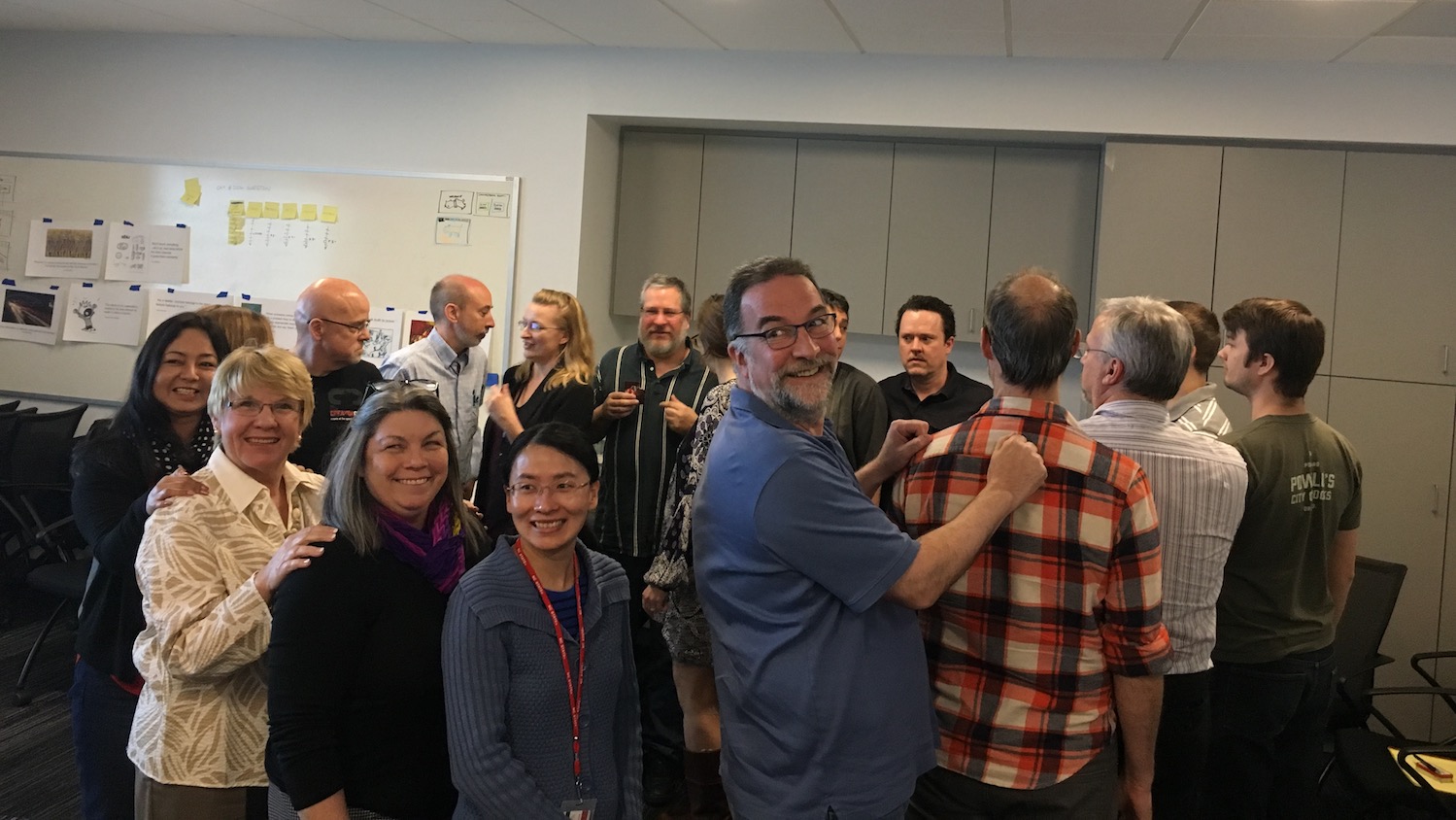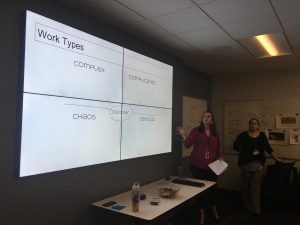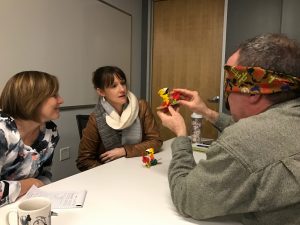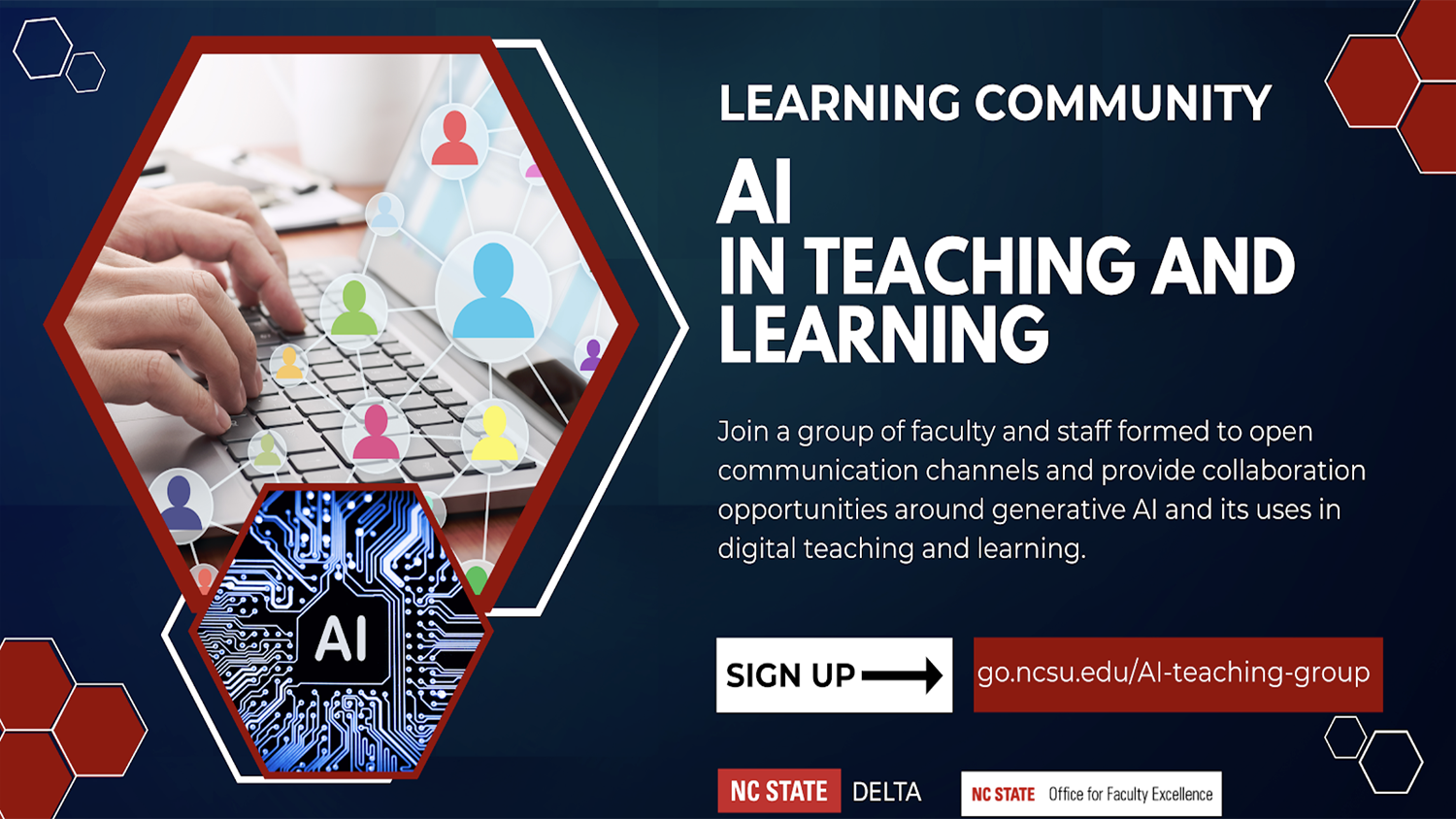Increasing Efficiency, Collaboration Through Agile

A group of DELTA project coordinators and program managers attended the Agile2016 Conference and came back ready to share the knowledge they had gained as well as incorporate new approaches and practices to promote collaboration and efficiency among DELTA staff.
Katie Bean, Laurie Gyalog, Samantha McCuen and Merranie Zellweger attended the conference and found numerous sessions to be particularly valuable on the topics of continuous improvement, teamwork, communication and leadership.
Agile is the ability to create and respond to change in order to succeed in an uncertain and turbulent environment. “Agile” methodology began as a way to discuss the best practices involved in software development. From there, the idea of collaboration between development teams, business stakeholders and internal and external employees expanded into the Agile Alliance. Today, Agile Alliance is used by anyone looking to expand collaboration and learning, from project managers to software developers.
“I think it’s great when colleagues come back from conferences and share what they learned. This particular conference gave us a lot of great information and tools that we thought we could implement immediately at DELTA,” said Bean.
After the conference, Bean, Gyalog, McCuen and Zellweger hosted workshop sessions for all of DELTA to attend. The sessions were titled “Work Types and Management + M&M’S®,” “Moose on the Table: Retrospective Lego Serious Play,” “Kanban and KitKats” and “Communication and Cookies.” Each session was interactive and engaging to lead to a memorable learning experience for DELTA staff.
Work Types and Management + M&M’S®

This session focused on the idea that everyone at DELTA is a leader. Leadership is not limited to managers, there are leaders of projects, ideas, expertise and experience.
“One of my favorite conference presentations centered around aligning work types and management types — the success from doing so, and the challenges when these two are not aligned,” said Zellweger.
Zellweger and Gyalog facilitated a leadership reflection to encourage participants to make observations about themselves and others’ styles. Then, using a Cynefin framework, Zellweger identified four work types: Obvious, Complicated, Complex and Chaos; and four corresponding management types: Coordination, Collaboration, Facilitative and Command. The room was divided into four quadrants representing these pairings and participants completed group exercises to identify the main functions of management in each work type area.
Senior Coordinator of Learning Technologies Martin Dulberg noted this particular session was enjoyable and informational. “It helped me by reminding me that not everyone is like me or makes decisions the way I do. While I know this intellectually, it is always helpful to be reminded!”
To learn more about Work Types and Management view these resources.
Moose on the Table: Retrospective Lego Serious Play

While Legos may be seen as a popular children’s toy, the Agile attendees found the benefits of Legos can be used by DELTA staff to deal with the challenging topic of retrospectives. Lego Serious Play allows retrospectives to remove some of the emotion that can be associated with tough discussion.
“Retrospectives tie into communication. Sometimes they can be difficult or uncomfortable but by asking specific project questions you are able to target specific project details without personal critique,” said McCuen.
During Moose on the Table: Retrospective Lego Serious Play, DELTA participants started with a moose and from there created abstract changes based on how they felt about a specific project, both positively and negatively.
“The use of Legos during a retrospective allows conversation to be representative rather than direct,” said McCuen. It allows for introverts and extroverts, managers and supervisors and DELTA staff of all units to interact with one another. Lego Serious Play levels the playing field and allows everyone to speak and be heard by their co-workers.
Kanban and KitKats

When Bean and Gyalog returned from the Agile Conference they were excited to bring back a new organizational task management system. Kanban is a project management technique that uses physical cards or notes to mark when a process or task needs to be done, when it is in process and when the task is complete.
“Kanban has helped the Marketing and Communications team visualize our work and has provided more transparency and better resource allocation. Now anyone at the organization can look at the Kanban board and know who is working on what during any given week,” said Bean.
At first, Kanban was implemented within the Marketing and Communications team. From there the use of Kanban led to interest from a variety of groups. Different teams and projects have since benefitted from using Kanban as a project management tool. “Each team has implemented it in a way that works for them,” said Bean.
“Kanban creates visual task management and enhances communication and collaboration around a shared vision. One of the biggest impressions from the Agile Conference was the understanding of how to bridge many project management practices we use daily,” said Gyalog.
Gyalog will return to the Agile Conference in August with the goal expanding her toolkit and continuing to learn and ask questions. She hopes to increase efficiency and collaboration and visibility through Agile methodology and practices.
Communication and Cookies

McCuen found her sessions on communication strategies to be the biggest takeaway from the Agile Conference. When she returned, McCuen and Gyalog led an interactive workshop for DELTA staff titled Communication and Cookies.
“During this session, we focused on why communication is important in an organization and how to handle difficult communication. By turning emotion into data, it is much easier to talk about efficiencies and inefficiencies in a project,” said McCuen.
The session consisted of an empathy game with three roles: builder, guide and observer. The builder was blindfolded and instructed by the guide to assemble a three-dimensional puzzle. The observer noted how well the builder and guide communicated throughout the activity.
As a result, DELTA staff recapped the activity to see the importance of establishing a common language to successfully complete a project and knowing the end goals of any project before beginning.
Another Agile strategy McCuen found beneficial was getting to failure quicker. “When you recognize failure, it may not mean the entire project has failed but it does allow room for learning and ultimately getting to a successful outcome more quickly,” said McCuen.
Implementing Agile
Since attending the conference, DELTA staff have implemented several of the techniques. Some of the team members will be attending the 2017 Agile Conference and will undoubtedly have new suggestions to help streamline our work flows and improve communication.
“I’m always looking for new tools and ideas to help us grow, both innovatively and efficiently. Agile is one of those conferences that provides both tactics and inspiration in equal measure, and well beyond just the Agile methodology,” said Zellweger.


